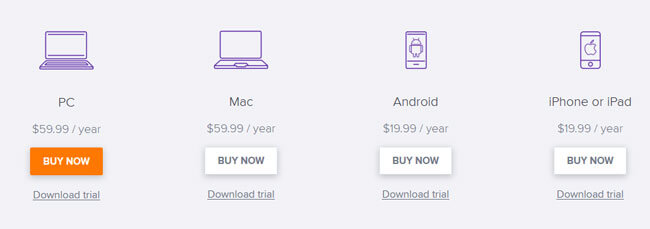
Secure DNS products like Cloudflare 1.1.1.1 exist precisely because some feel VPNs are overkill. Since most sites now support secure HTTPS connections, much of your online experience is already encrypted. There's debate among security experts about the efficacy of VPNs. Secure DNS is improving privacy already, but VPNs go further. When you use a VPN's DNS system, it's another layer of protection. Greedy attackers can also use DNS poisoning to direct you to bogus phishing pages designed to steal your data. Savvy snoops can monitor DNS requests and track your movements online. Think of DNS as a phone book that turns a text-based URL like "" into an IP address computers can understand. Many VPN services also provide their own DNS resolution system. We recommend using the anti-tracking features in your browser and installing dedicated ad or tracker blockers. These range from online trackers to browser fingerprinting. Advertisers have many tactics at their disposal to gather data on you and track your movements. There are also limitations to how anonymous you can be with a VPN.
#Avast vpn review password
We strongly recommend using local antivirus software, enabling multi-factor authentication wherever available, and using a password manager to create and store unique, complex passwords for each site and service you use.
#Avast vpn review download
A VPN can't help if you download ransomware or if you give up your data in a phishing attack. VPN services, while helpful, don't provide every kind of threat protection you might need. Proxies: What's the Difference? What Are the Limitations of VPNs? To learn more, read our explainer, VPNs vs. Note: VPNs are not the same thing as proxies, with which they are sometimes confused. You can use this to your advantage and connect to distant VPN servers to spoof your location, too. Hiding your IP address has another benefit: it makes it harder for snoops to figure out your location. Even dedicated observers have a hard time telling whose internet traffic is whose, because your data is mixed in with that of everyone else using the server. This makes it harder to track you across. A VPN prevents even your ISP from keeping tabs on you.Īnother VPN benefit is that your true IP address is hidden behind the address of the VPN server. Considering you are already paying for the service, selling your data seems egregious. To make matters worse, Congress has decided your ISP is allowed to sell your anonymized browsing history. In the US, your ISP has enormous insight into your online activities. How do you know, for example, "starbucks_wifi-real" is actually the Wi-Fi network for said coffee shop? In fact, a popular security-researcher prank is to create a network with the same name as a free, popular service and see how many devices automatically connect.Įven if you're inclined to trust your fellow humans, you might not want to trust your internet service provider (ISP). Public Wi-Fi networks, which are ubiquitous and convenient, are unfortunately also convenient for attackers. This is true even if the snooper controls the network. With a VPN, no one snooping around your network can see what you're up to. No one who was following you can know where you went. With a VPN, it's like driving from your house into an underground tunnel, exiting into a closed parking garage, switching to a different car, and driving out. They might even peek into your car to learn more about you. Think of it like this: when your car pulls out of your driveway, someone can follow you and see where you're going, how long you're at your destination, and when you return.

#Avast vpn review for free
Private Internet Access VPN - 85% off a two-year plan with an extra four months for free - £1.69 per month.CyberGhost VPN - 82% off a two-year plan with an extra two months for free - £1.92 per month.ExpressVPN - 49% off a one-year plan with an extra three months and Backblaze cloud storage include - £5.70 per month.It sounds simple, but VPN usage can improve your privacy online. If you only connect to websites secured with HTTPS, your data will continue to be encrypted, even after leaving the VPN. From there, your traffic exits onto the web as normal. When you use a VPN, it routes your internet traffic through an encrypted connection to a server controlled by the VPN company. Best Hosted Endpoint Protection and Security SoftwareĮditors’ Note: While they may not appear in this story, IPVanish and StrongVPN are owned by Ziff Davis, PCMag's parent company.


 0 kommentar(er)
0 kommentar(er)
